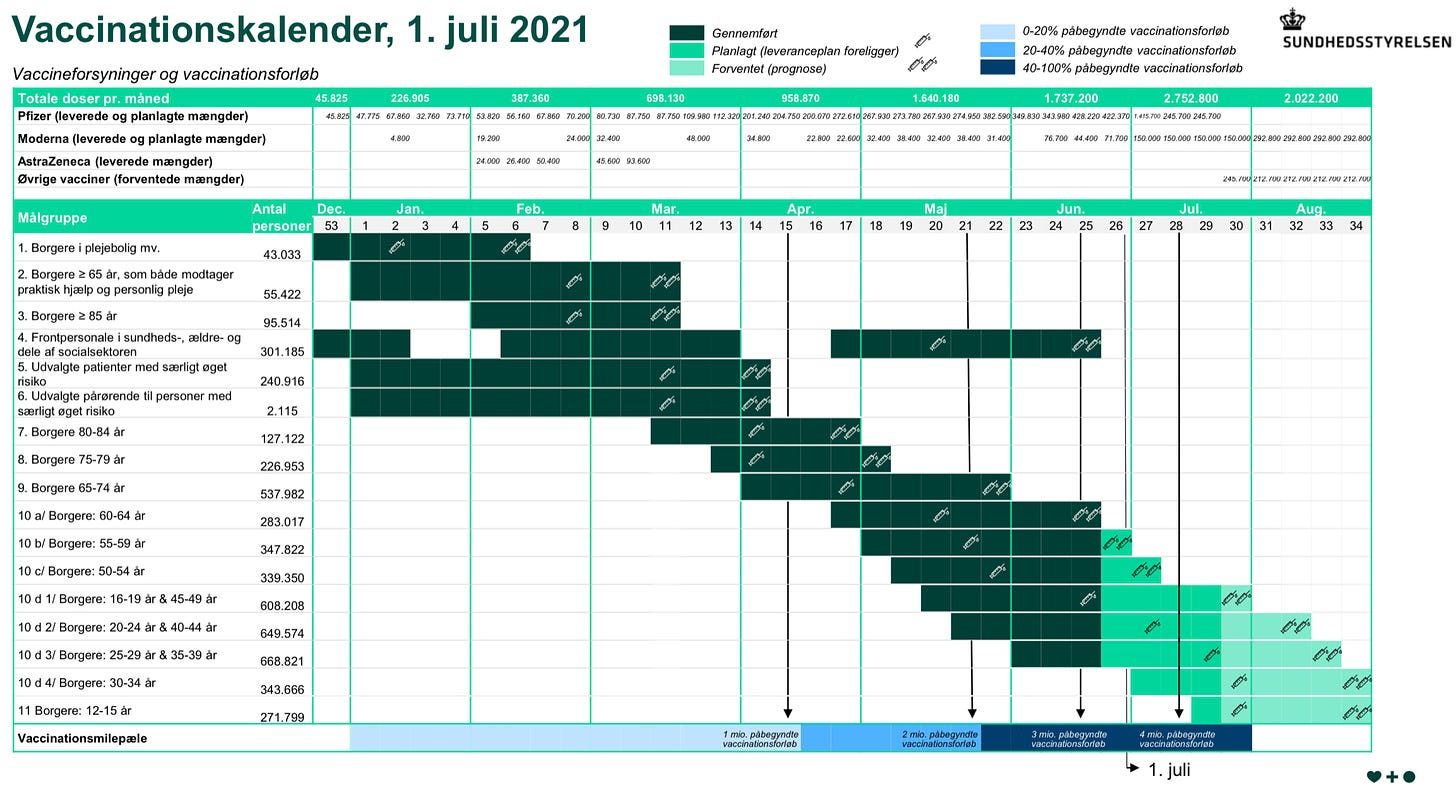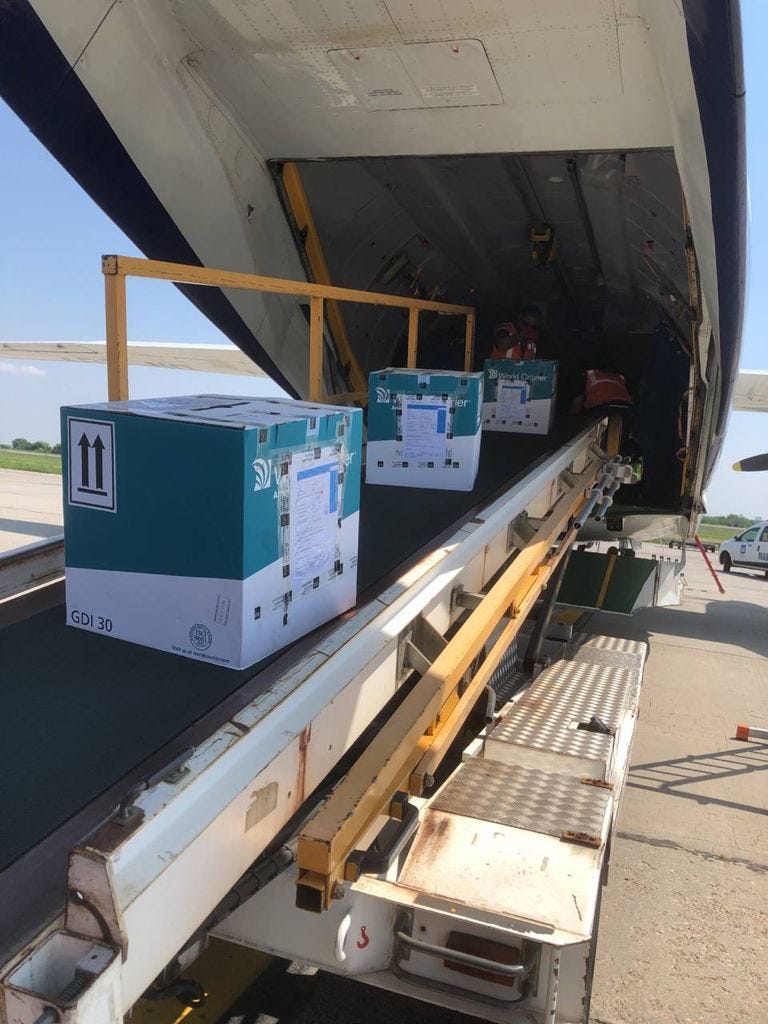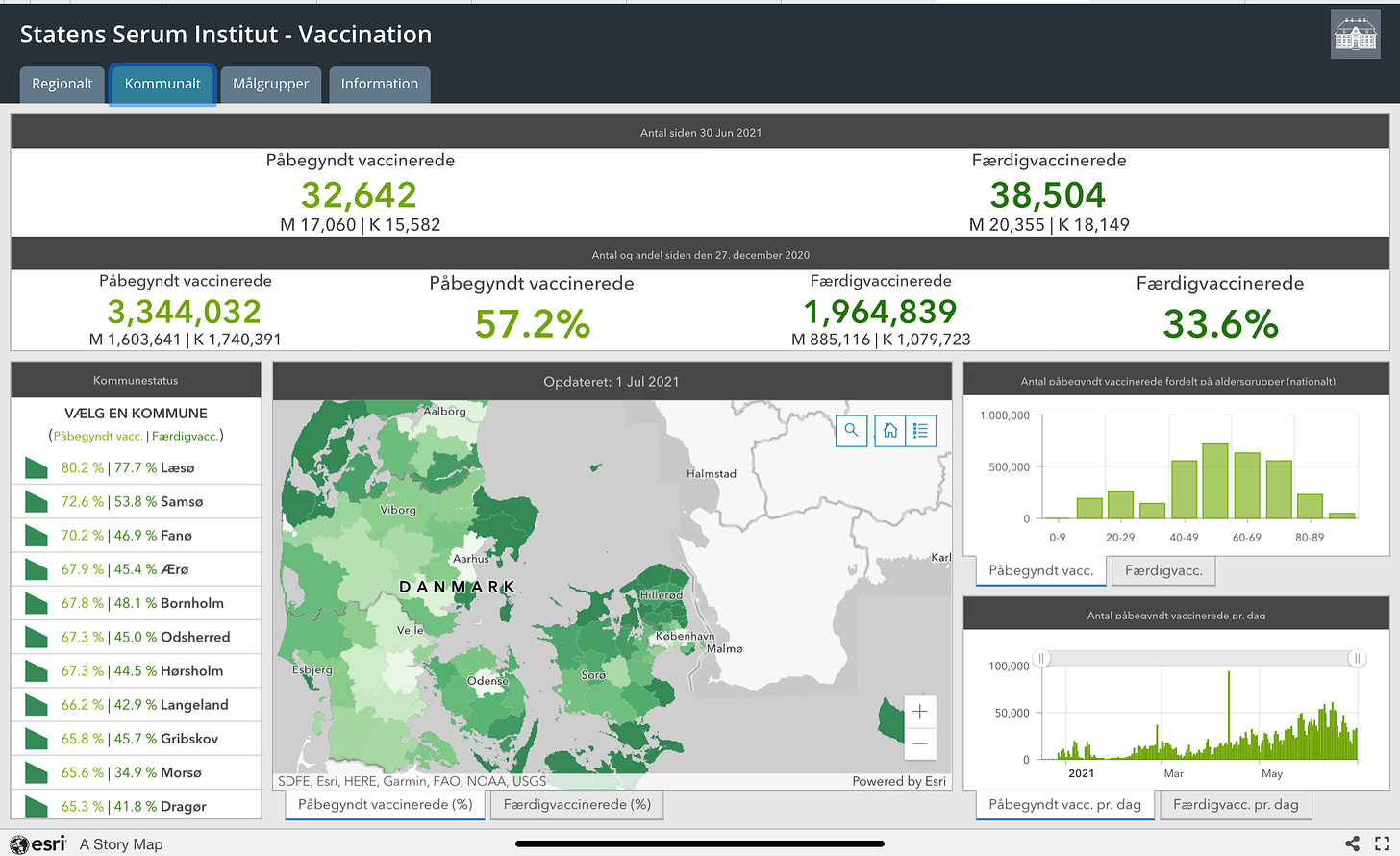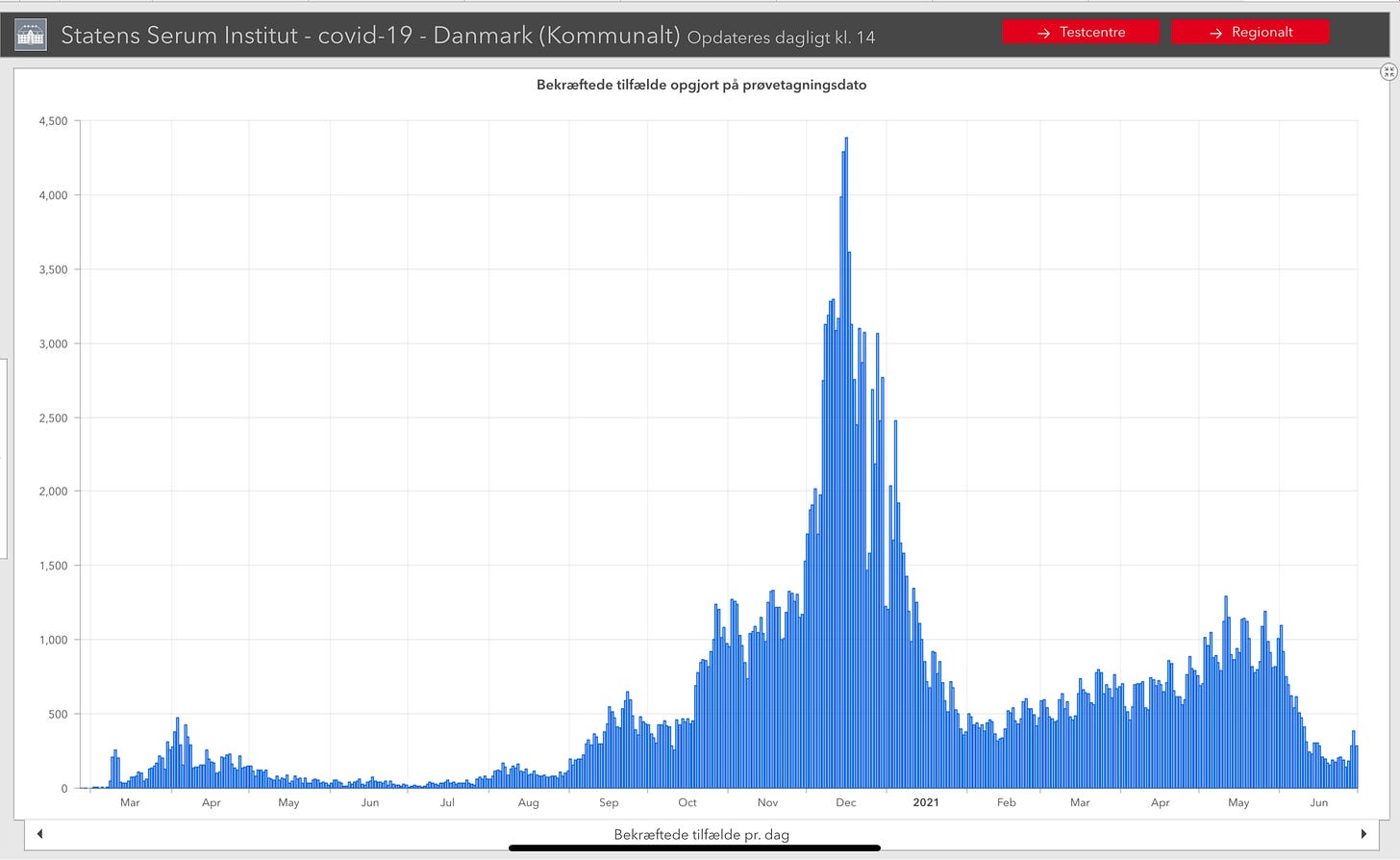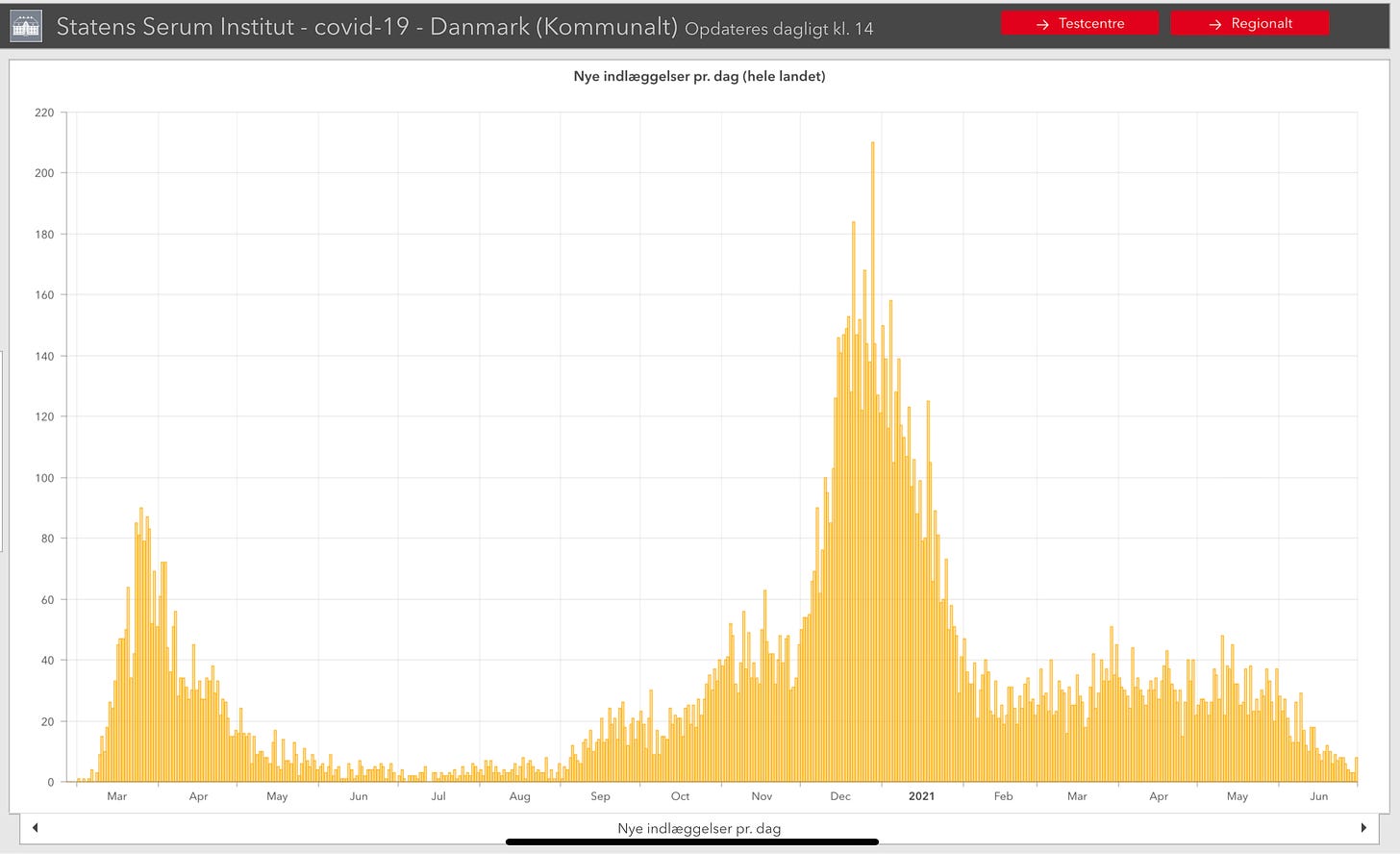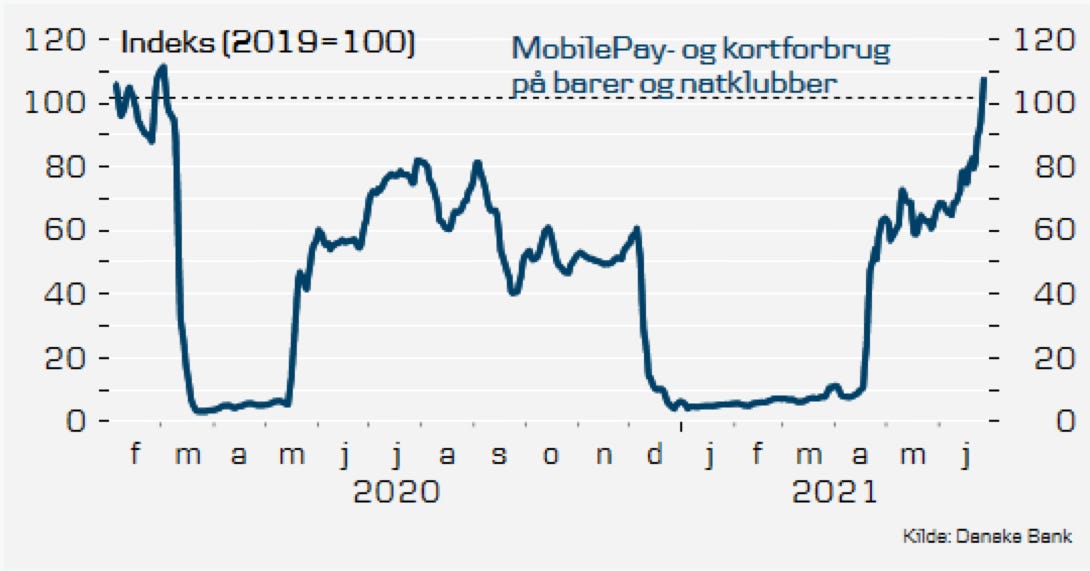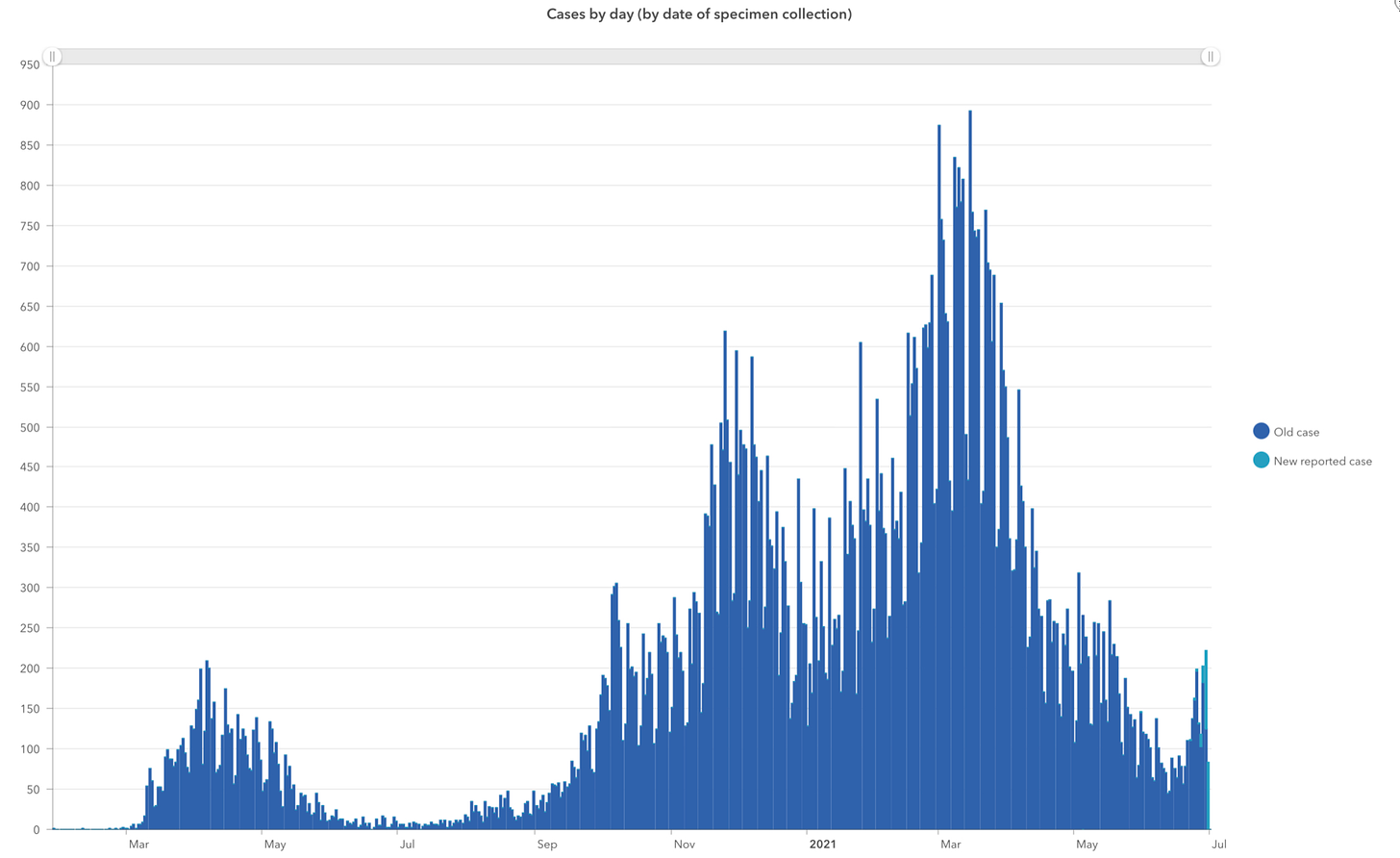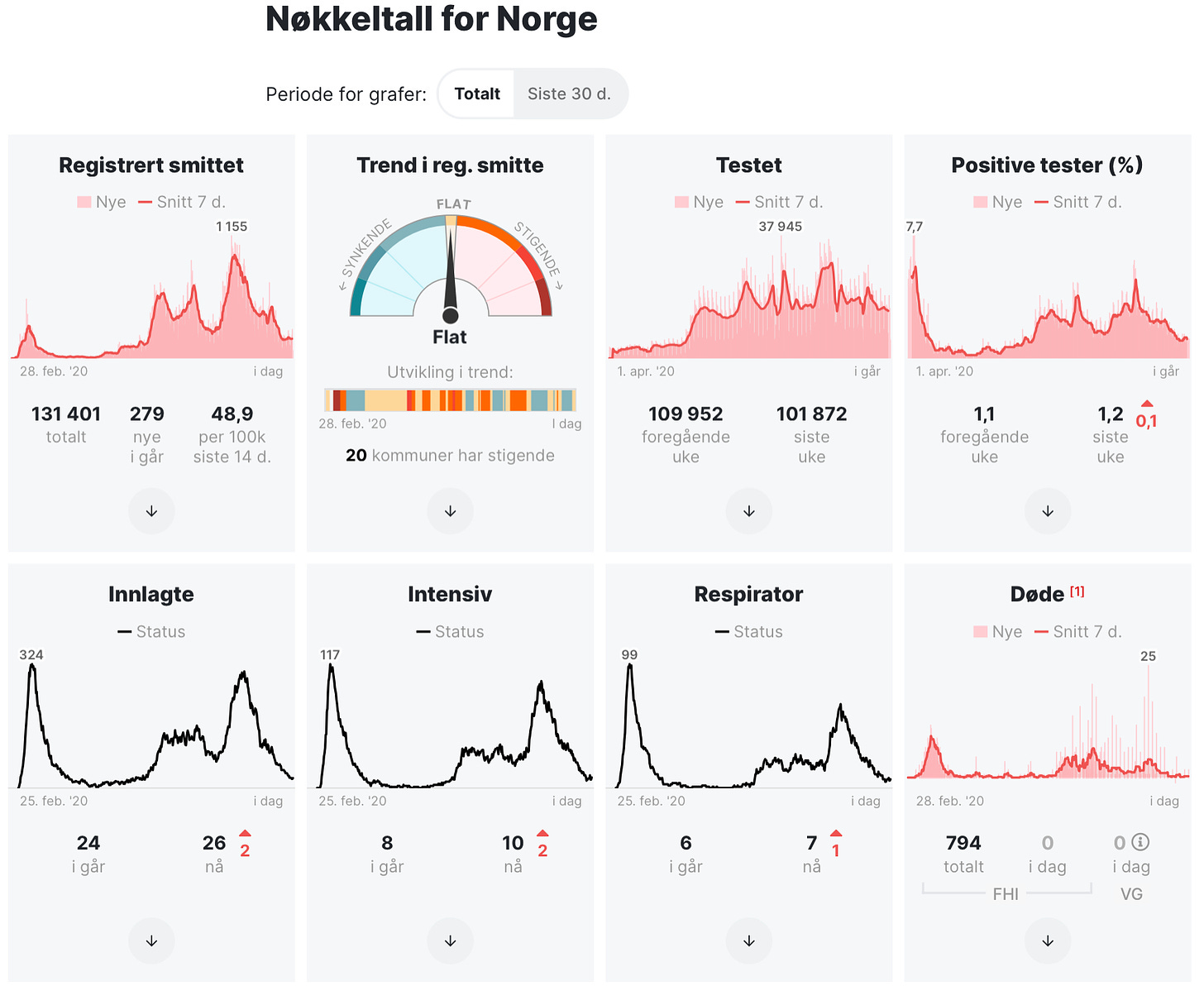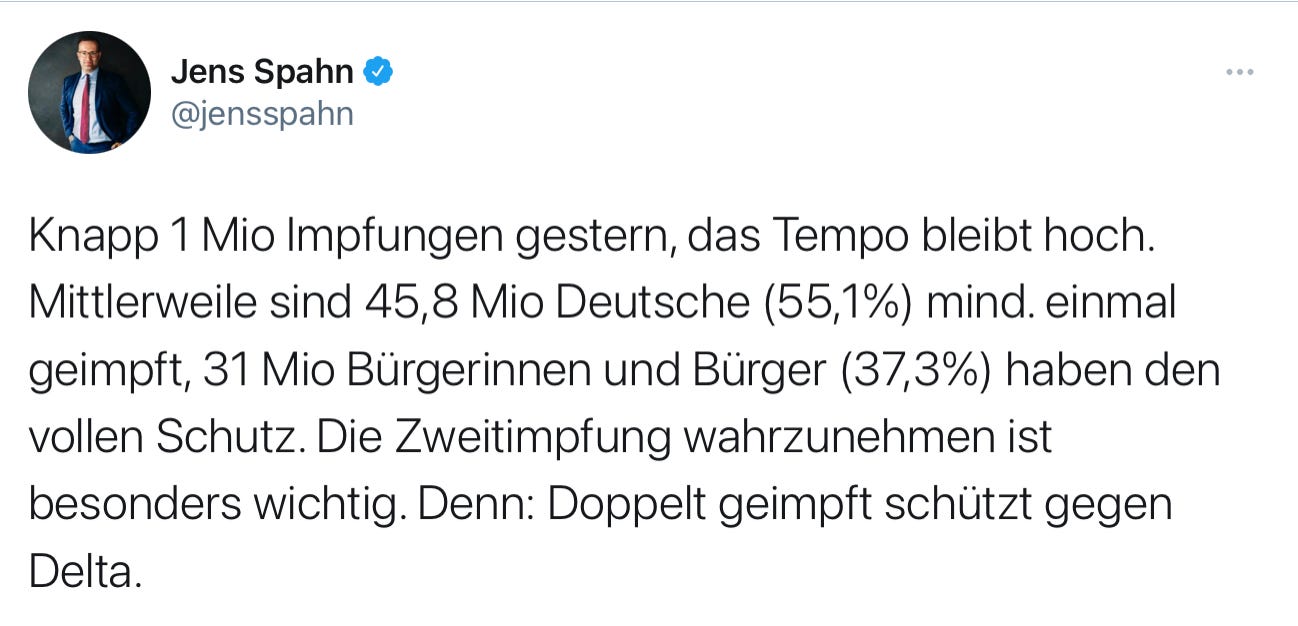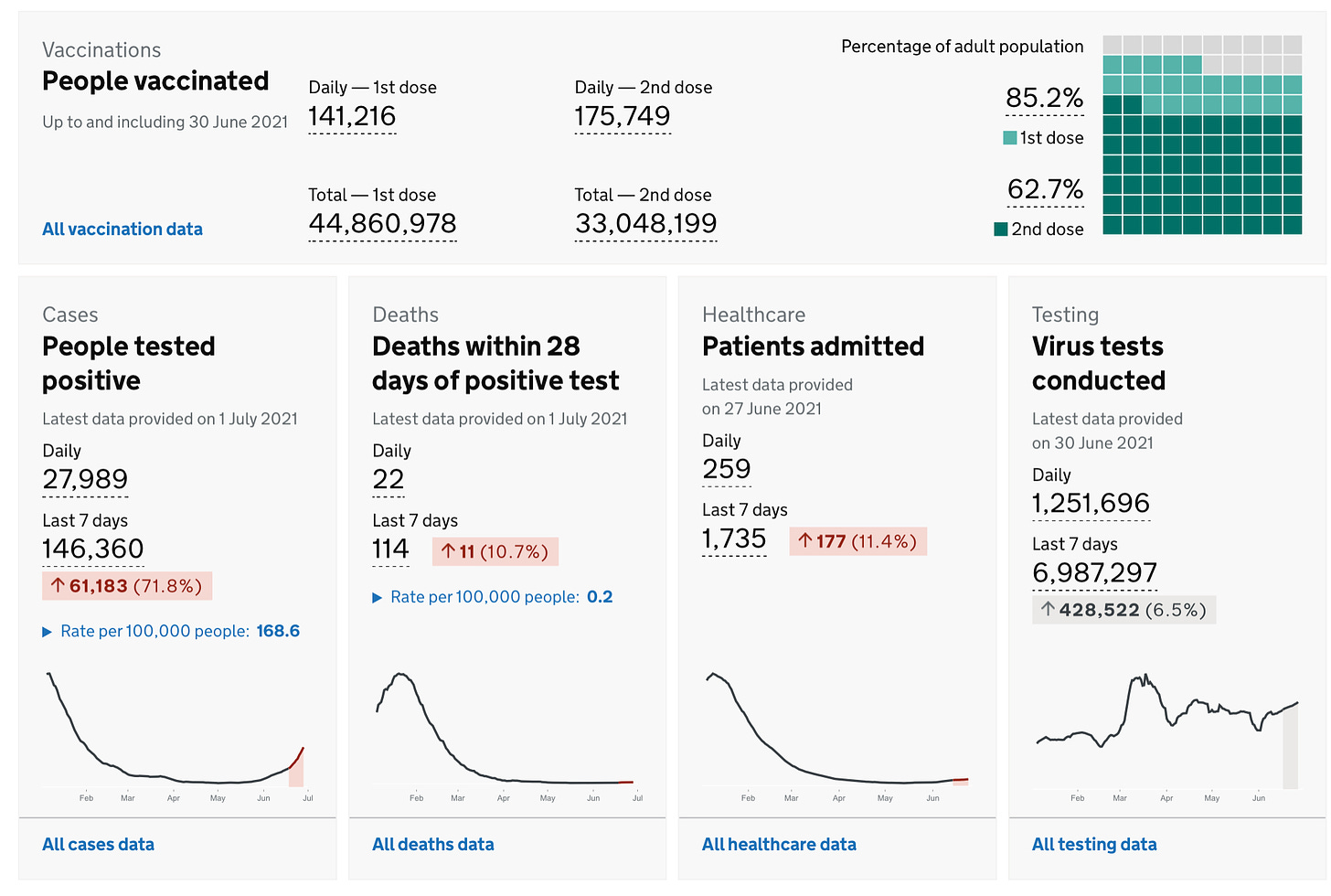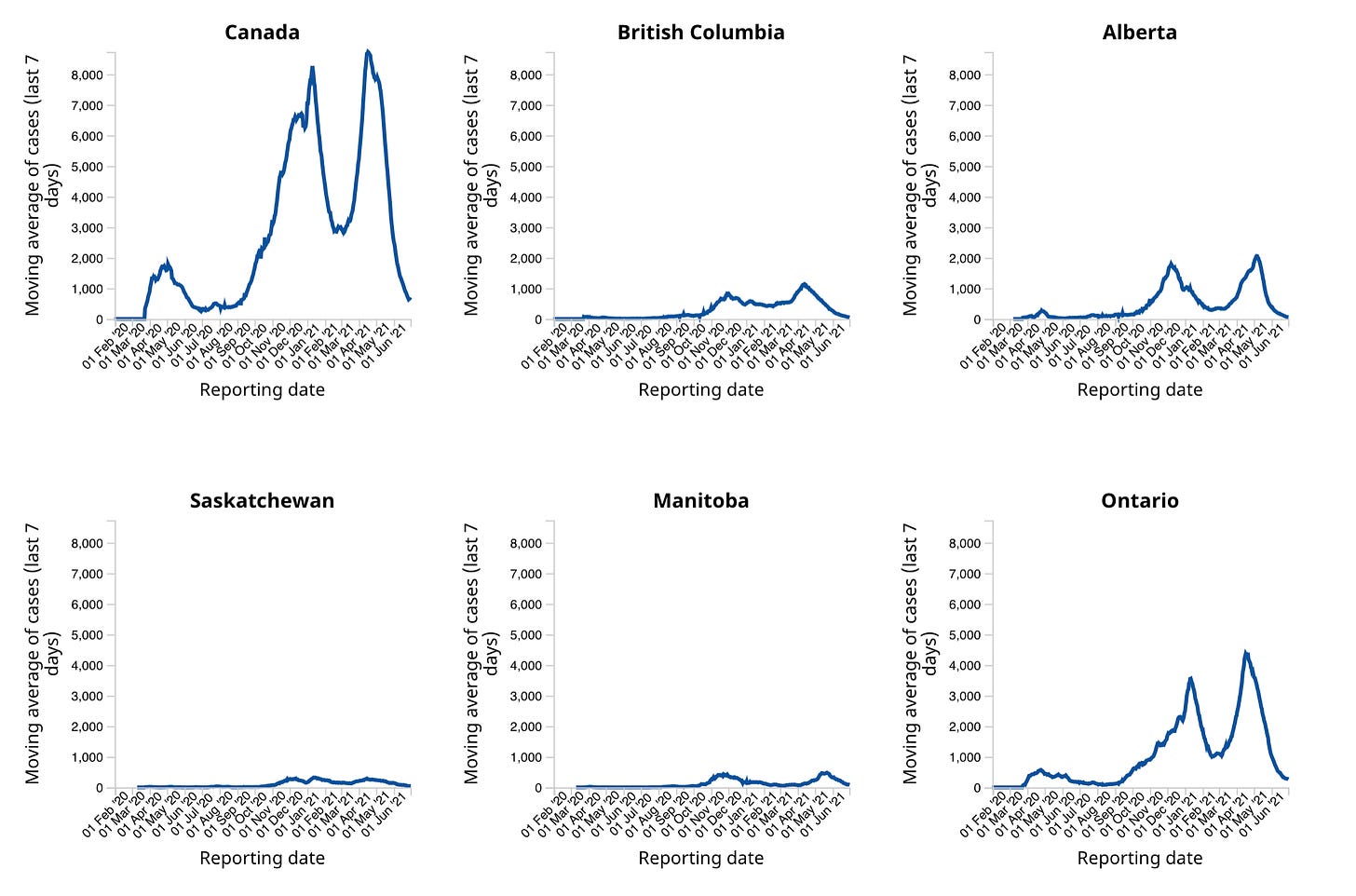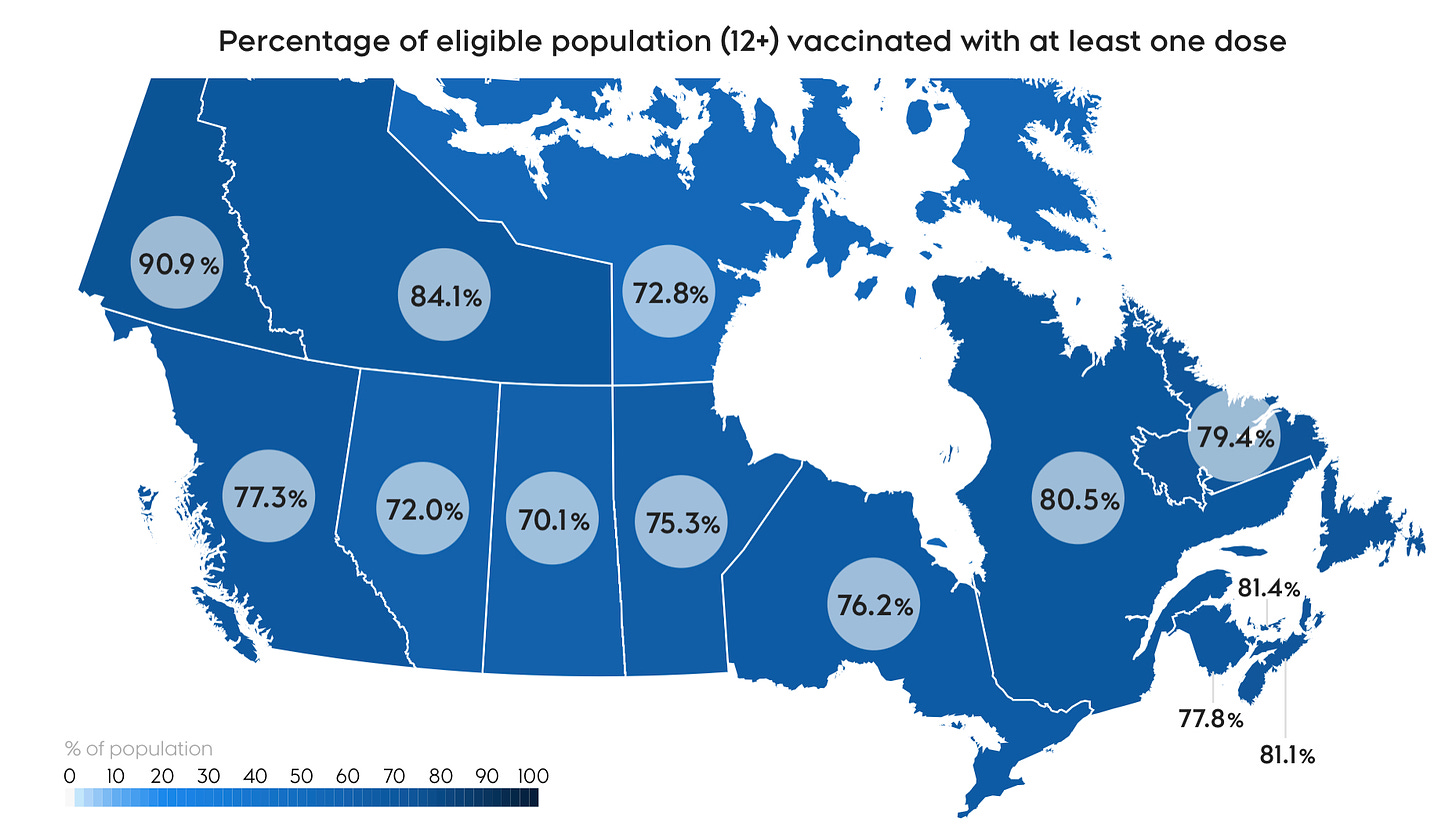The Evening Update - July 1
Denmark’s vaccination timeline shortened due to an influx of new doses
🇩🇰
Some good news on the vaccination front. The Danish National Health Board says the influx of 1.17 million doses of the Pfizer vaccine will shave several weeks off the timeline. Everyone, including the new group of adolescents aged 12 to 15 years old, should now get a first dose by the end of August. That is a big improvement on a timeline that was pushing deep into September.
A new vaccination calendar was released today.
Deputy Director Helene Probst says things are already speeding up.
“We can now advance vaccination of the 30-34-year-olds. That group has waited a long time and been patient, and it is a great pleasure that we have had the opportunity to advance their vaccination schedule. We can now sense the end of mass vaccination of the first 10 target groups and it is one of the great milestones that is approaching. We have added a target group 11, namely the 12-15-year-olds and we expect that we can start inviting them in approximately two weeks.”
It isn’t just all the added doses bought from Romania, Moderna has also announced it will be able to ship more doses than initially thought to Denmark. This has helped offset a decline in Pfizer deliveries.
-
The Staten Serum Institut says the first shipments of the 1.17 million Pfizer doses purchased earlier this week began flying from Romania to Denmark today. It is expected that the new influx of vaccines will begin to arrive at the various regions for use within days.
Region Hovedstaden says it is opening all of its vaccination centers to peak capacity. According to the region, that means it will be able to administer up to 750,000 vaccinations a month. The health authority has also opened over 330,000 new appointment slots that can be booked over the summer. It says new vaccination invitations will be sent out beginning next week.
-
Region Sjælland medical officer responsible for the vaccination program, Søren Rasmussen, says they are ready for the extra Pfizer doses from Romania to arrive. He has confirmed the region is expecting an extra 168,000 vaccine doses from the purchase.
-
On the vaccination front to date, 3,344,032 1st-dose vaccinations (57.2% of the population) have been administered while 1,964,839 people (33.6%) are now fully vaccinated.
Yesterday, there were 71,146 total inoculations done.
Denmark has donated over two-million vaccine doses to a number of countries in need. In a press release, Foreign Affairs Denmark says one-million doses will go to Albania, Bosnia-Herzegovina, Kosovo and Northern Macedonia in the Western Balkans. Another one-million doses is also being donated to the WHO led COVAX initiative trying to supply desperately needed vaccines to developing countries.
All two-million vaccine doses are from AstraZeneca, with Foreign Affairs Denmark specifying they are vaccines that have been bought and paid for “but which have not yet been delivered to Denmark. Work is underway to begin donations over the coming months.”
Foreign Affairs Minister Jeppe Kofod:
“Our neighbors in the Balkans are experiencing a great shortage of vaccines, which both burdens individual communities and increases the risk of new outbreaks that can spread. That is why I am glad that we can step in and assist our close partners with the absolutely crucial weapon against the pandemic, vaccines. The Western Balkans are part of our immediate area, and we have a great common interest in standing together against the pandemic.”
Denmark is also donating another 250,000 AstraZeneca doses from existing supplies to Bhutan. The country is desperate for vaccine doses to administer second shots. Danish authorities are working to get the vaccines to Bhutan as soon as possible.
-
Denmark is reporting 475 COVID infections and one more coronavirus death in the last day.
Yesterday, there were 310,126 total corona tests done, 82,988 PCR, and 227,138 rapid, for a (PCR only) positivity percentage of 0.57%.
-
The EU COVID digital certificate has arrived. For those of us in Denmark, if you flip to the ‘international’ view you can see it already integrated into the app. Today also marks some changes. A negative PCR test is valid for 96 hours. A negative rapid test also now good for 72 hours. All children under the age of 16 are also exempt from having to show a coronapas. As well, immunity via vaccination or previous infection now lasts 12 months.
As of today, the EU Digital COVID certificate must be recognized by all EU and Schengen countries.
The Danish coronapas app has been downloaded more than two-million times so far.
-
COVID hospitalizations (52) have dropped (-3) while the number of infected people in an ICU (12) and of those the number on a ventilator (11) are both unchanged.
-
After test runs in Bornholm and some other kommunes, Denmark is rolling out a COVID early warning system by testing wastewater in 20 different municipalities across the country. The Staten Serum Institut says this is the first step in expanding the program to every kommune in the country.
In trial runs, testing wastewater for COVID was able to detect coronavirus flare-ups, often before they showed up in testing people. It can also detect the variant in play and often a pretty good idea exactly where the virus is showing up.
Danish officials say the program is an excellent way to do surveillance for COVID, allowing for quicker, geographically targeted response before it spreads further.
-
People in Denmark have been spending big bucks on a night out since restrictions began to be lifted. Danske Bank analyst Louise Aggerstrøm says spending in bars and nightclubs hasn’t been this high since March of last year, pretty much right before the COVID boom was lowered.
🇸🇪
Sweden had added 563 infections and one more corona death since yesterday’s update. The usual caveat about a lag in reporting still remains in place.
The Swedish Public Health Agency says a technical issue has prevented an update on vaccination numbers today.
-
As the Delta variant has the WHO warning Europe about another possible infection wave and the European Center for Disease Control urges EU nations to keep restrictions in place, Sweden is anticipating low infection spread this summer.
The Swedish Public Health Agency says its modeling shows infections will be low through the summer and then begin to climb again at the end of August.
“In order for society to be able to return to a normal situation, a high level of vaccination coverage is required.”
CEO Johan Carlson:
“A high level of vaccination coverage is central to returning to a normal situation where the population's contacts are as before the pandemic. But it is also important that everyone continues to follow current regulations, advice and recommendations this summer so that the spread of infection does not increase.”
The agency has tabled three possible scenarios for the months ahead. All three are based on social contacts. In one they stay fairly restricted, another they are eased somewhat, and in the third they go back to pre-pandemic normal. In all three, it says infections stay low through the summer.
-
The Swedish Public Health Agency says a new survey shows vaccine uptake is high across all age groups. The survey found 69% of respondents said they will absolutely get vaccinated while 18% said they probably would. For the first time, the survey included people aged 16 to 19 years old and in that group, 87% said they will get the jab.
Unit Manager Sara Byfors:
“It is very gratifying that there are still so many who are positive about getting vaccinated, and that this also applies to the younger people. It is also interesting to see that the motive for vaccination against COVID in all age groups is to protect oneself and to protect others.”
The survey involved 4,782 people.
🇫🇮
Due to the “deteriorating situation” in Russia, Finland’s health authority says all travel to Russia should be avoided. Finnish authorities are also stepping up COVID testing at the border. They advise anyone returning from Russia should isolate until they receive a negative test result.
-
Finland has registered 222 infections since yesterday’s update. Hospitalizations and fatalities are updated on Wednesdays.
Last week, Finnish officials said there were a total of 38 new COVID patients admitted to hospital and of those, seven were sent to an ICU.
To date, 3,290,624 1st-dose vaccinations (59% of the population) have been done while 1,032,348 people (18.5%) are now fully vaccinated.
-
The Finnish Health Institute says COVID infections leapt upward last week, with 947 total cases, an increase of 400 new infections from the week previous. The institute says the increase is “largely explained” by the thousands of Finns who went to St. Petersburg Russia for a EURO 2020 game. The agency estimates about 4,500 Finns attended the game, which has directly resulted in 386 confirmed coronavirus infections so far, with another 50 contacts already also infected. Most of the infections are in the capital region of Helsinki, with other corona cases sprinkled around Espoo, Vantaa, Pirkaanmaa, and Southwest Finland. It says more than 40% of all cases found last week were directly linked to the Russia EURO 2020 game.
The institute also notes, the number of total infections “acquired abroad” increased, responsible for a full half of all cases, an increase from the previous week’s 33%.
That said, the health institute says, other than clusters of outbreaks, the National picture remains “calm” in many areas and hospital districts.
🇳🇴
Norway has added 364 infections and had no new virus deaths in the last day.
COVID hospitalizations (26) and ICU numbers (10) are up (each +2) ventilator numbers (7) also rose (+1).
To date 48.76% of Norwegians have had one dose and 28.83% have had both.
🇩🇪
Germany’s Health Minister Jens Spahn says there were almost one-million vaccinations done yesterday. To date, 45.8 million people in Germany (55.1% of the population) have had one dose while 31 million people (37.3%) have had both. Spahn stresses that it is important to get as many people fully vaccinated as fast as possible to protect against the Delta variant.
🇪🇺💉🩺
The European Medicines Agency said today all the vaccines approved for use in the EU protect against all variant strains to date, after two doses, including the Delta variant. The agency made the announcement at a press conference today, citing results from real-world data. Europe’s pharmaceutical watchdog has asked for vaccine developers to continue to investigate efficacy against emerging corona variants.
The agency says in the case of the Johnson & Johnson vaccine the only one-shot COVID vaccine approved for use it is reviewing data on the safety and immune response for people who have received a second dose in trials.
The EMA says it is also talking with vaccine developers on the potential use of booster doses “to determine the best timing and best strategy.” It adds at this point it is unclear whether vaccine boosters will even be necessary.
🇬🇧
The Delta variant continues to push infection numbers up in the UK, one of the world’s most vaccinated countries. It logged 27,989 new infections today, numbers not seen since January, while losing another 22 lives. Infections, hospitalizations, and fatalities all continue to trend upward.
🇺🇸
The American Center for Disease Control is warning that COVID cases are going up again in some parts of the States. The CDC says the 7-day average of daily new cases is 12,609, an increase of 10.3% from the week before. It is urging people in the US to get vaccinated as soon as they can to protect themselves and their community.
🇨🇦
In non-COVID news, an unfolding tragedy in Lytton, B.C. The town set temperature records three days in a row and on the fourth a wildfire possible sparked by a passing train exploded and burnt the town down. While the situation is fluid, it sounds like 90% of the historic town is no more.


-
Canada reported 528 infections yesterday, while suffering another 22 coronavirus deaths. Nationally and among the provinces, the infection curve continues to trend down.
The Canadian vaccination campaign has so far administered 25,722,761 1st dose vaccinations (67.56% of the population) while 11,662,059 people (30.63%) are now fully vaccinated.
In Ontario today there were 184 infections and 14 more lives lost to the pandemic.
Quebec reported 126 infections and another three fatalities.
In Atlantic Canada, Nova Scotia logged four new infections. Newfoundland and Labrador had one. New Brunswick had none.
Manitoba saw 70 infections and another two deaths.
There were 31 infections and no new deaths in Saskatchewan yesterday.
Alberta registered 76 infections and two more deaths yesterday. Today it is lifting virtually all remaining restrictions.
B.C. recorded 44 infections with no new deaths. Today it enters the next phase of reopening. Among the changes is that the mask mandate is ended.




